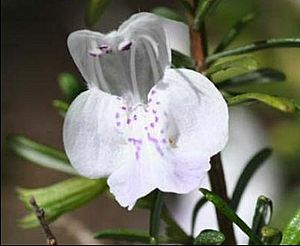Apalachicola rosemary facts for kids
Quick facts for kids Apalachicola rosemary |
|
|---|---|
 |
|
| Conservation status | |
| Scientific classification | |
| Genus: |
Conradina
|
| Species: |
glabra
|
Conradina glabra is a very special and rare plant. It's a type of shrub that smells like mint, often called Apalachicola rosemary. You can only find it in a small area in Liberty County, Florida. Because its home is disappearing, it is an endangered species. This means it's protected by law.
Where it Lives
This unique plant grows only in the northern part of Liberty County, Florida. It likes sandy areas and forests. You can find it growing near oak trees and tall longleaf pines (Pinus palustris). Some of the places where it still grows are inside Torreya State Park.
What it Looks Like
This plant is an aromatic shrub. This means it has a nice smell. It can grow up to 80 centimeters or even one meter tall. Its branches have thin, needle-like leaves. These leaves are about 1.5 centimeters long and smell like mint.
Flowers
The plant produces small groups of two or three flowers. These flowers grow where the leaves meet the stem. Each flower is about 1 to 2 centimeters long. They are a pale lavender color. The lower part of the flower has darker purple spots.
How it Grows
Conradina glabra can make new plants in two ways. It can grow from seeds, which is called sexual reproduction. It can also sprout new shoots from its base. This is called vegetative reproduction.
Why it's Endangered
The main reason this plant is in danger is because its home is being lost. The land where it grows has changed a lot. People have turned forests into farms. They also changed native pine forests into plantations of slash pine (Pinus elliottii). This started in the 1950s.
Habitat Loss
Large areas of the original pine forests were cut down. They were replaced with these new tree farms. Sometimes, you can find the rare Conradina glabra growing at the edges of these new plantations. It's hard to know how many of these plants there were before. This is because the plant was only discovered after these changes began.


